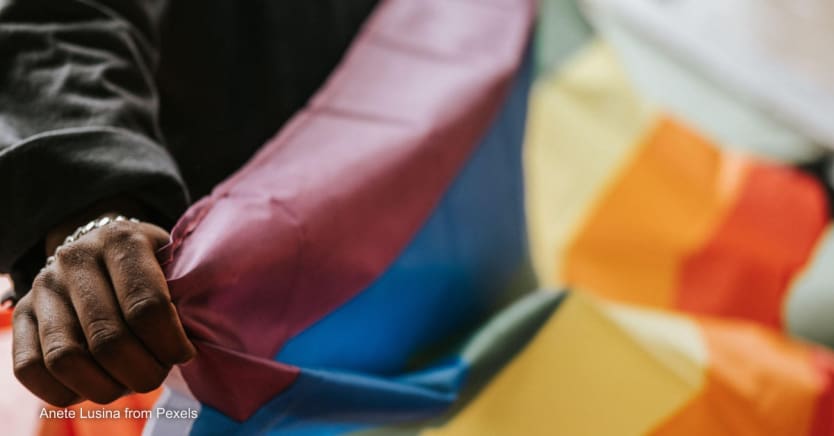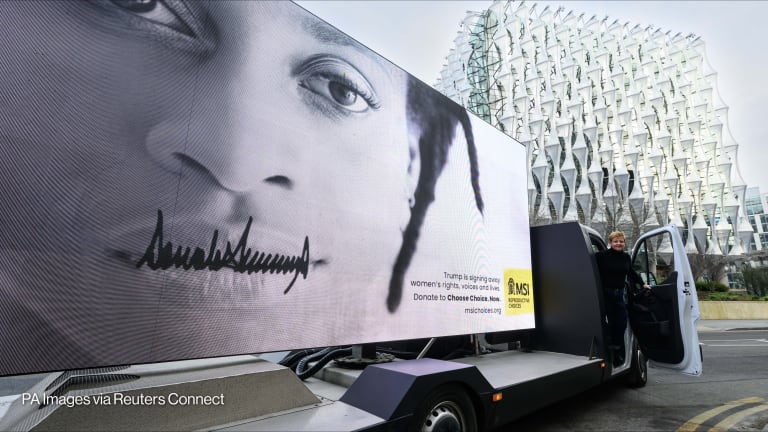
While Pride originated with the 1969 Stonewall riots in the United States, queerness and queer activism are global. Year-round across countries, LGBTQ organizations and activists defend human rights, change discriminatory policies, provide affirming spaces, and defy strict definitions of manhood and womanhood.
However, for those members of the LGBTQ community currently living in conflict and crisis areas, humanitarian support for these efforts is currently failing, despite global commitments for inclusion.
A new study by the International Rescue Committee finds that LGBTQ people face multiple, compounding risks during political conflicts. Many are forced to leave their family of origin, often at a young age, due to ongoing abuse, exclusion, and stigma.
Intersecting factors such as refugee status, language, and being “out” can influence when and whether someone is forced to flee home, community, or conflict, as well as the resulting protection risks they may face. Additionally, displacement can separate LGBTQ survivors from family as well as friends who understand and respect their identity.
In contrast to its global mandate, the humanitarian system perpetuates exclusion and discrimination against LGBTQ people. There is little evidence to suggest that the sector — originally designed to support cis-heterosexual family structures — has succeeded at inclusion. Identity cards may not recognize chosen names or gender identity, and LGBTQ people may need to “prove” their queerness to be recognized.
Health or protection services may not address the beautiful diversity of sexual orientations, gender identities, or sex characteristics of individuals and may engage in harmful practices. Such failures, combined with stigma against LGTBQ people, have deadly consequences.
Accountability to LGBTQ people requires that we take tangible steps to ensure that LGBTQ survivors of conflict and displacement have a say in how humanitarian organizations are run.
—Policy approaches either do not account for or actively discriminate against LGBTQ peoples and their rights. Three of the top refugee-hosting countries in the world have policies that criminalize homosexuality and/or do not recognize same-sex marriage. As such, even if ration cards used for cash transfers do not explicitly state that family members refer to heterosexual couples, such laws prohibit recognition of LGBTQ relationships.
Discriminatory policies, in turn, shape humanitarian response: LGTBQ peoples are excluded from financial markets and employment opportunities, and discrimination is compounded based on refugee or displacement status. These current cycles of displacement, abuse, and broader instability are often the historical remnants of punitive religious and legal customs remaining from colonization.
This pushes LGBTQ people into unstable, informal, and criminalized forms of employment. For example, LGBTQ people engaging in criminalized forms of income-generation, such as transactional exploitative sex work, are subjected to violence from clients and police alike, with limited options for recourse.
The humanitarian community must heed calls to action from LGBTQ-led and serving organizations, researchers, and activists to address these failures.
First and foremost, all work to better support LGBTQ peoples in humanitarian settings should be led by and in service to local LGBTQ organizations. This requires donors to provide the majority of grant funding, whether tied to specific project outcomes or provided as flexible/unrestricted core funding, directly to these organizations.
Across the sector in 2020, only 3.1% of funding was distributed to local NGOs, and only 17% of funding was unrestricted. Building equitable partnerships across the sector is key to long-term sustainability and impact, especially with organizations serving LGBTQI+ and other oppressed populations.
Secondly, in environments unsafe due to legal or contextual factors, international humanitarian organizations must first be seen as welcoming, supportive, and holistic spaces for people to seek care or services from and build partnerships with.
Without long-standing credibility in serving LGBTQ or other oppressed identities, organizations must not target or force disclosure of identities in programming or research, as this could increase visibility and risk for harm.
Instead, such organizations should work in partnership with LGBTQ-led and -serving organizations on training and accountability, create anonymous feedback mechanisms to gauge respectful provision of care, and commit to non-discrimination with actionable consequences.
Opinion: Benchmarking race, inclusion, and diversity in US dev orgs
The “Benchmarking Race, Inclusion, & Diversity in Global Engagement” survey provides an industry-wide benchmark for development and humanitarian assistance organizations in the U.S.
Thirdly, new programming models need to be tailored and supported with ethical and nuanced research and learning. For example, a resounding theme from the study was the active exclusion from financial systems and economic opportunities for LGBTQ populations. Such services need to be tailored to address legal, community, and individual challenges and enablers and supported with robust learning efforts to improve our understanding of how to do this work better.
Lastly, LGBTQ leaders have called for international organizations to focus on internal organizational change. This requires an interrogation of organizational policy and practice — staff must be knowledgeable and sensitive to LGBTQ issues and accountable to zero-tolerance policies for discrimination or bias. Clients, partners, and international NGO staff members must have opportunities for reporting these issues with deep commitments to non-retaliation.
The IRC supports LGBTQ survivors of conflict and provides virtual gathering spaces for LGBTQ employees, but we still have a long way to go to achieve equity within our organization. This includes engaging staff across countries and levels in non-discrimination and inclusion training, designing programming and services to be more inclusive from the start, and creating clear and transparent accountability mechanisms, reinforcing the equal value of LGBTQ staff.
Echoing calls to reconsider power distributions, accountability to LGBTQ people requires that we take tangible steps to ensure that LGBTQ survivors of conflict and displacement have a say in how humanitarian organizations are run. It is our collective mandate and responsibility to ensure that our services and organizations are safe spaces for LGBTQ people — it is time we heed the call.









